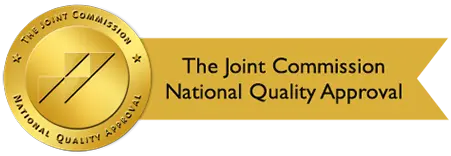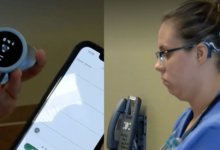Nursa Earns The Joint Commission Seal for Commitment to Excellence

The Joint Commission (TJC) Grants Nursa Accreditation
Nursa was awarded the Gold Seal of Approval® by The Joint Commission (TJC) in recognition of Nursa’s successful and ongoing efforts to uphold high standards of qualified and competent services. The Joint Commission extends the Gold Seal to healthcare organizations that consistently meet the Commission’s standards in the areas of:
Nursa shares the values stated by the Joint Commission of quality services, teamwork for a productive work environment, respect for individual well-being and diversity of the staff, courtesy in all relationships, empowerment of each employee, continual improvement, and integrity in all transactions.

What is the Joint Commission?
The nation’s oldest and largest accreditation organization in the area of healthcare, the Joint Commission sets quality standards, assesses organizational performance, and in the evaluation process, provides an interactive educational experience leading to innovative solutions and resources for ongoing improvement.
What’s the Mission of the Joint Commission?
With the mission “to continuously improve health care for the public… by evaluating health care organizations and inspiring them to excel safe and effective care of the highest quality and value,” the Joint Commission works with more than 22,000 hospitals, laboratories, nursing services, healthcare organizations, and other related establishments towards continued improvement in addition to well-deserved respect and recognition.
What’s the History of The Joint Commission?
Although the Joint Commission’s roots trace back to the foundation in 1913 of the American College of Surgeons and the “result” system of hospital standardization as one of their objectives, the Joint Commission on Accreditation of Hospitals (JCAHO) as such was created in 1951 in Chicago, Illinois.
When Did the JCAHO become the Joint Commission?
In its now 71 years of service and growth, some of the major milestones have been:
- 1965: Congress approves the Social Security Amendments, stipulating that hospitals accredited by JCAHO are “deemed” compliant with most Medicare Conditions of Participation for hospitals and are accepted to participate in Medicare and Medicaid programs.
- 1994: The first organization-specific performance reports are released to the public, achieving higher levels of transparency.
- 2002: JCAHO established the National Patient Safety Goals® to help accredited organizations address significant areas of concern, together with the ground-breaking Speak Up™ program urging patients to become assertive, helpful, and knowing participants on their healthcare team. From 70 to 80% of Joint Commission operations directly address the issue of patient safety.
- 2005: JCAHO began certifying health care staffing services, lung volume reduction surgery, left ventricular assist devices, and the nation’s first certification for chronic kidney disease management.
- 2005: The name is shortened to The Joint Commission.
- 2021-2022: Collaboration expands with many influential institutions and entities, including:
- The American College of Obstetricians and Gynecologists to reduce maternal mortality and morbidity in the U.S.;
- The Alzheimer’s Association to enhance the quality and safety of dementia care in long-term residential facilities;
- The White House is committing to ending hunger and decreasing diet-related diseases in the U.S. by 2030.
- Kaiser Permanente to acknowledge and award organizations for initiatives that accomplish a measurable, unremitting abatement in health care disparities;
- American Society for Clinical Pathology to support laboratory leadership and raise the visibility of the medical laboratory team.
Many of these collaborative expansions of the Joint Commission activities contribute to the Patient Safety Goals, which are updated yearly.
What is Joint Commission Accreditation?
Based on an unannounced, on-site survey, accreditation is awarded to organizations that meet the specific quality measures for health-related outcomes, an unbiased evaluation of quality achievement, especially in patient care and safety.
Joint Commission surveyors assess the performance of operations and processes, aspiring to advance patient outcomes continuously. They do this by:
- Tracing the care to patients or residents.
- Examining data, information, and documentation furnished by the organization.
- Observing and interviewing personnel and, if advisable, patients.
The Joint Commission mostly accredits organizations in the U.S. However, it also works in as many as 100 other countries worldwide. The organizations receive a helpful evaluation report, and the public can check out accredited healthcare organizations using Quality Check™, which can be accessed at http://https://www.qualitycheck.org/.
What Does Joint Commission Accreditation Mean for Nursa?
The Process
The Joint Commission requires a review every other year to maintain accreditation. The review examines Nursa’s capacity to deliver competent services, contemplating procedures and processes for gathering and assessing credentials of clinician or healthcare providers using its platform, vetting of the clinicians or healthcare providers using its platform,,, ensuring competent clinicians or healthcare providers are available to suitable healthcare facilities through the use of the Nursa platform,, and other facets of performance.
Advantages of Joint Commission Accreditation
With accreditation, organizations earn significant benefits. Some of these are:
- Clear authentication of their commitment to a higher standard of service.
- External validation of sound business practice.
- A framework for improving performance.
- Increased credibility, a competitive edge in the marketplace.
- Improved services that are more appropriate and competent.
- Qualification for recognition by insurers and other third parties may reduce liability insurance costs.
Nursa has completed the unannounced survey, earned the distinction of Joint Commission accreditation, and extends appreciation and thanks for the many benefits of this process.







